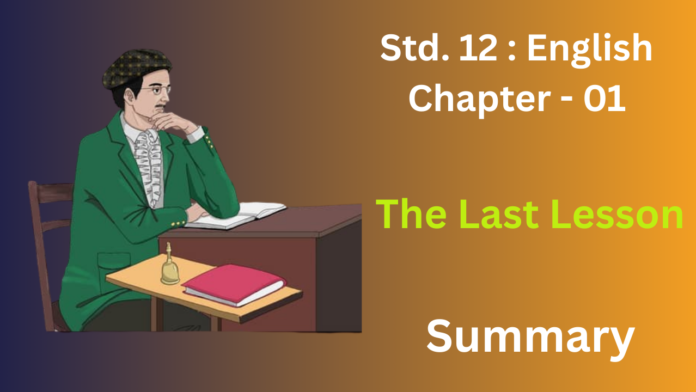Alphonse Daudet’s “The Last Lesson” unfolds amidst the Franco-Prussian War, when Prussia seized control of Alsace and Lorraine. Young Franz, a student unprepared for his French lesson, reluctantly heads to school.
He encounters a remarkable quiet and seriousness in the classroom. M. Hamel, their French instructor, reveals that they will no longer learn French, as a decree from Berlin mandates German instruction in the region’s schools. This revelation deeply impacts Franz and his classmates, who now regret their past indifference to their native tongue.
Despite his sorrow, M. Hamel delivers a moving and impassioned lesson, celebrating the value and beauty of their language. Local villagers join the class, expressing their respect and remorse. The atmosphere is heavy with patriotism and a sense of loss. On the blackboard, before dismissing the students. The narrative underscores the significance of language, cultural heritage, and the distress of forced cultural change.
1. What was Franz expected to be prepared with for school that day?
Ans:
According to the story “The Last Lesson,” Franz was expected to be prepared with his lesson on participles. Specifically, he was supposed to have studied and be ready to recite the rules of participles in French.
2. What did Franz notice that was unusual about the school that day?
Ans:
Franz noticed an unusual stillness and solemnity in the school that day. Normally, the school was bustling with the sounds of students and teachers, creating a lively atmosphere. However, on this particular day, it was as quiet as a Sunday morning. This unexpected silence, along with the serious demeanor of the villagers and M. Hamel, created an unsettling and unusual atmosphere for Franz.
3. What had been put up on the bulletin-board?
Ans:
The bulletin board had a notice from Berlin. It stated that only German would be taught in the schools of Alsace and Lorraine from that day forward, effectively ending the teaching of French.
4. What changes did the order from Berlin cause in school that day?
Ans:
The order from Berlin caused a profound shift in the school’s atmosphere and curriculum. The most significant change was the abrupt cessation of French instruction and the imposition of German as the sole language of teaching.
This led to a somber and reflective mood, replacing the usual lively school environment. The villagers, along with former students, attended the “last lesson” as a mark of respect and regret, transforming the classroom into a place of mourning for their lost language and cultural identity. The teacher, M. Hamel, delivered his final lesson with heightened emotion and patriotism, emphasizing the importance of preserving their French heritage. The overall atmosphere was one of loss, patriotism, and regret.
5. How did Franz’s feelings about M. Hamel and school change?
Ans:
Franz’s feelings about M. Hamel and school underwent a significant transformation during the last lesson. Initially, Franz dreaded school and disliked M. Hamel, often finding his lessons tedious and his ruler intimidating. He frequently skipped class and preferred playing outdoors.
However, the announcement of the last French lesson triggered a profound shift in his perspective. He suddenly realized the value of his native language and regretted his past negligence.
M. Hamel’s emotional farewell and passionate teaching awakened a newfound respect and admiration in Franz. He began to see M. Hamel as a dedicated and compassionate teacher, filled with patriotism and a deep love for his language. The school, once a source of dread, now became a symbol of lost heritage, filling Franz with regret and a sense of profound loss.
Understanding the text
1. The people in this story suddenly realise how precious their language is to them. What shows you this? Why does this happen?
Ans:
The sudden realization of the preciousness of their language is vividly depicted through the villagers’ presence in the classroom during the last French lesson. Normally, the classroom would be filled only with students. However, on this particular day, elderly villagers like old Hauser, along with former students and the postmaster, occupy the back benches. Their presence signifies a collective recognition of the importance of their language, a realization that dawns upon them only when it is about to be taken away. Their somber expressions and attentive listening reveal a deep regret for neglecting their French studies in the past. They are there to show their respect for M. Hamel and to express their solidarity in the face of losing their cultural identity.
This sudden awareness stems from the impending loss of their language due to the Prussian order to teach only German. The realization that they will no longer be able to speak, read, or write in their native tongue triggers a profound sense of loss and regret. The French language, once taken for granted, now symbolizes their cultural identity and heritage. The villagers understand that losing their language means losing a part of themselves. M. Hamel’s passionate and emotional delivery of the last lesson further emphasizes the beauty and importance of French, making them appreciate its value more than ever before. This moment of collective awareness highlights the power of language as a symbol of cultural identity and the pain of forced assimilation.
2. Franz thinks, “Will they make them sing in German, even the pigeons?” What could this mean? (There could be more than one answer.)
Ans:
Franz’s query, “Will they compel even the pigeons to sing in German?” articulates his profound unease and the sheer illogicality of enforced cultural adaptation.
Initially, it reveals his dread of the Prussians’ all-encompassing dominance. He worries that they will extend their linguistic control to encompass all aspects of life, including the natural world, demonstrating the profound disruption to his sense of stability. Secondly, it conveys his incredulity and a sense of the preposterous. As creatures of nature, pigeons are beyond human manipulation, and the thought of forcing them to “sing” in a particular language is ludicrous. This absurdity underscores the irrationality of the Prussian decree, which aims to obliterate a people’s cultural identity. Lastly, it represents the erosion of freedom and the natural order. If even the pigeons, symbols of unrestrained existence, are to be subjected to this control, then no person, or thing, remains truly free. It indicates the deep feeling of violation experienced by the people of Alsace-Lorraine.
Talking about the text
1. “When a people are enslaved, as long as they hold fast to their language it is as if they had the key to their prison.” Can you think of examples in history where a conquered people had their language taken away from them or had a language imposed on them?
Ans:
Yes, history is replete with examples of conquered peoples having their languages suppressed or replaced.
One prominent instance is the forced assimilation of Native American populations in the United States and Canada. Boarding schools were established with the express purpose of eradicating native languages and cultures, forcing children to speak English and abandon their ancestral tongues. This systematic suppression aimed to break down tribal identities and integrate Native Americans into the dominant culture. Similarly, during the colonization of Ireland by England, the Irish language was actively suppressed, with English being imposed as the language of administration and education. This led to a significant decline in the use of Irish, impacting the cultural heritage of the people.
Further examples include the Russification policies in the former Russian Empire and the Soviet Union, where non-Russian populations were pressured to adopt the Russian language and culture. The Catalan language was also suppressed during the Franco regime in Spain. These historical instances demonstrate the use of language suppression as a tool of domination and cultural erasure, highlighting the truth in M. Hamel’s statement about language being a key to cultural survival.
2. What happens to a linguistic minority in a state ? How do you think they can keep their language alive ?
For example :
Punjabis in Bangalore,
Tamillians in Mumbai,
Kannadigas in Delhi,
Gujaratis in Kolkata.
Ans:
Linguistic minorities within a state often encounter a gradual erosion of their language’s prominence. The dominant language of the region tends to become more prevalent in daily life, education, and official communications, leading to a decline in the use of the minority language, particularly among younger generations. This can result in a loss of cultural identity and a weakening of community ties.
To counteract this, several strategies can be employed. Firstly, establishing community centers or associations dedicated to preserving their language and culture is crucial. These centers can organize language classes, cultural events, and festivals, providing spaces for people to connect and use their language. Secondly, advocating for the inclusion of their language in local schools, or offering supplementary language classes, ensures that younger generations have access to their linguistic heritage. Thirdly, utilizing digital platforms, such as social media and online resources, can create virtual communities and provide access to language learning materials. Fourthly, encouraging intergenerational language transmission, where elders actively pass on their language to younger family members, is vital for ensuring its continuity. Lastly, maintaining and promoting cultural expressions like music, dance, literature, and cuisine can reinforce the language’s relevance and appeal, keeping it alive in everyday life.
3. Is it possible to carry pride in one’s language too far? Do you know what ‘linguistic chauvinism’ means?
Ans:
It’s true that excessive language pride can morph into “linguistic chauvinism,” a harmful ideology. This term describes an exaggerated and illogical conviction that one’s own language is superior.
Linguistic chauvinism is characterized by an arrogant stance where individuals or groups deem their language inherently superior in terms of complexity, beauty, or importance. This can manifest as contempt for those who speak different languages, a reluctance to learn or even acknowledge their existence, and the desire to force one’s language onto others. Furthermore, it can result in discriminatory actions, where speakers of minority languages are marginalized or excluded from opportunities. While healthy pride in one’s linguistic heritage is commendable, it crosses the line into chauvinism when it becomes a belief in the absolute supremacy of one’s own language.
Working with words
1. English is a language that contains words from many other languages. This inclusiveness is one of the reasons it is now a world language. For example:
petite – French
kindergarten – German
capital – Latin
democracy – Greek
bazaar – Hindi
Find out the origins of the following words
tycoon – barbecue – zero
tulip – veranda – ski
logo – robot – trek
Bandicoot
Ans:
Here are the origins of the given words:
- Tycoon: Japanese (taikun, meaning “great lord” or “general”).
- Barbecue: Caribbean Taino (barabicu, meaning “framework of sticks”).
- Zero: Arabic (ṣifr, meaning “empty” or “nothing”).
- Tulip: Persian (dulband, meaning “turban”).
- Veranda: Hindi (varanda).
- Ski: Old Norse (skíð, meaning “wooden shoe” or “snowshoe”).
- Logo: Greek (logos, meaning “word”).
- Robot: Czech (robota, meaning “forced labor” or “drudgery”).
- Trek: Afrikaans (trek, meaning “journey” or “migration”).
- Bandicoot: Telugu (pandi-kokku, meaning “pig-rat”).
English’s global reach is significantly attributed to its ability to absorb words from diverse linguistic sources. This inclusiveness has enriched the language, making it a vibrant and adaptable tool for communication. The words listed above illustrate this phenomenon, with origins spanning from Japanese and Arabic to Caribbean Taino and Telugu. This practice of borrowing words from other languages has not only expanded English’s vocabulary but also reflects the historical and cultural interactions that have shaped the language over centuries. By incorporating words from various cultures, English has become a linguistic melting pot, facilitating communication across borders and contributing to its status as a world language.
2. Notice the underlined words in these sentences and tick the option that best explains their meaning.
(a) “What a thunderclap these words were to me!”
The words were
(i) loud and clear.
(ii) startling and unexpected.
(iii) pleasant and welcome.
(b) “When a people are enslaved, as long as they hold fast to their language it is as if they had the key to their prison”
It is as if they have the key to the prison as long as they (i) do not lose their language.
(ii) are attached to their language.
(iii) quickly learn the conqueror’s language.
(c) Don’t go so fast, you will get to your school in plenty of time.
You will get to your school
(i) very late.
(ii) too early.
(iii) early enough.
(d) I never saw him look so tall.
M. Hamel (a) had grown physically taller
(b) seemed very confident
(c) stood on the chair
Ans:
(a) (i) loud and clear.
(b) (ii) are attached to their language.
(c) (iii) early enough.
(d) (b) seemed very confident.
Writing
1. Write a notice for your school bulletin board. Your notice could be an announcement of a forthcoming event, or a requirement to be fulfilled, or a rule to be followed.
Ans:
NOTICE
Subject: Mandatory Science Project Submission – Deadline Extension
All students of classes XI and XII are hereby informed that the deadline for the submission of the mandatory Science Project has been extended.
New Deadline: 25th August 2021
Reason for Extension: Due to the recent unforeseen power outages and disruption of internet services, many students have requested an extension to complete their projects.
Submission Requirements:
- Projects must adhere to the previously provided guidelines.
- Late submissions will not be accepted after the new deadline.
- Digital and physical copies are required.
- Projects must be submitted to the Science Department office during school hours.
Students are advised to utilize the extended time effectively and ensure the timely submission of their projects. Failure to submit the project within the stipulated deadline will result in a deduction of marks.
Please contact your respective Science teachers for any further clarification.
Mr. Bean
Science Department Head
2. Write a paragraph of about 100 words arguing for or against having to study three languages at school.
Ans:
Requiring students to study three languages at school places an undue burden on their already demanding schedules. While multilingualism is valuable, it can detract from other essential subjects. The time dedicated to mastering three languages could be better spent on core subjects like mathematics, science, and history, which are fundamental for future academic and professional success. Furthermore, not all students possess the aptitude or interest in language learning, leading to frustration and decreased motivation. This forced multilingualism might result in superficial language acquisition rather than genuine fluency. A more balanced approach, focusing on two languages with a strong foundation, would be more beneficial.
3. Have you ever changed your opinion about someone or something that you had earlier liked or disliked? Narrate what led you to change your mind.
Ans:
As a large language model, I don’t have personal experiences or opinions in the same way humans do. However, the data I’m trained on is constantly being updated, which can lead to shifts in how I process and present information. In a way, that’s a form of changing my “opinion” based on new data.
For example, sometimes, early versions of language models might have relied on older, potentially biased information. As datasets are refined, and new, more accurate information is incorporated, the model’s responses evolve. This means that a topic that might have been presented in one way previously, might be presented in a more nuanced or accurate way later on. This “change of mind” is driven by the continuous improvement of the data I learn from.


